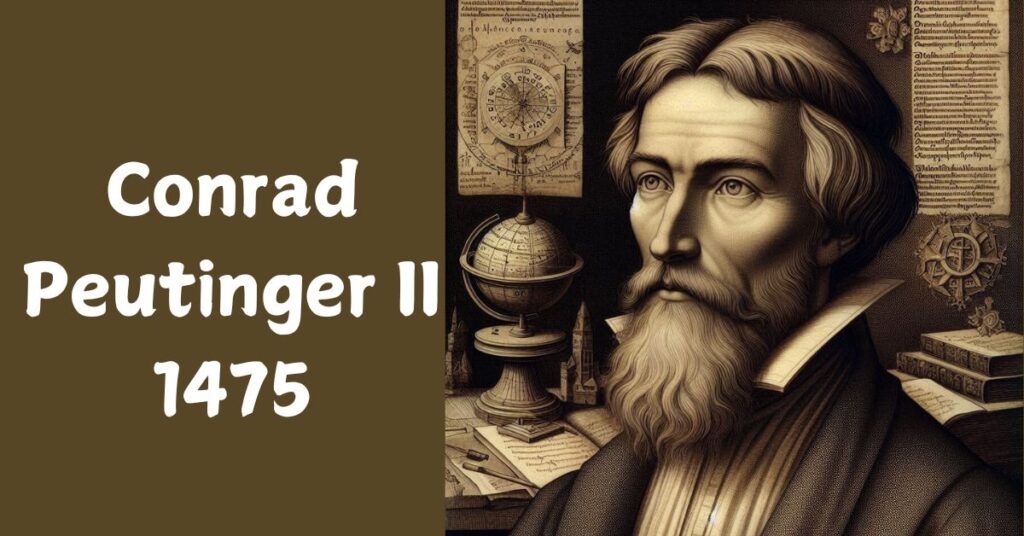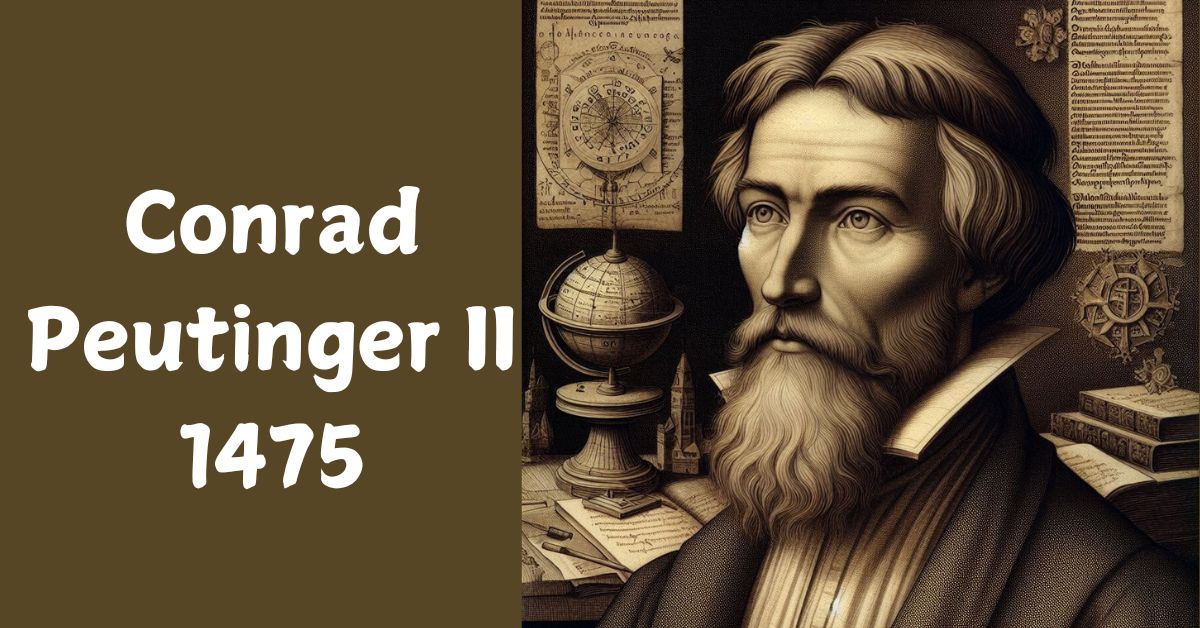
Conrad Peutinger II 1475, born in Augsburg, Germany, in 1475, was a significant figure of the Renaissance era. His life and work spanned many fields, including law, humanism, diplomacy, and scholarship, making him a crucial player in the intellectual and political landscape of the early 16th century. This article explores Peutinger’s life, his achievements, and his legacy, providing insight into one of the foremost humanists of his time.
Early Life and Education
Peutinger was born into a prominent family in Augsburg, a major center of commerce in the Holy Roman Empire. His father, Conrad Peutinger I, was a wealthy merchant, which allowed the young Peutinger access to education and intellectual circles from an early age. Augsburg was an important city for trade and the dissemination of new ideas during the Renaissance, making it an ideal environment for Peutinger’s intellectual development.
He studied at several leading universities of the time, including those in Italy, where he was exposed to the ideals of humanism. Peutinger earned a law degree at the University of Padua, a city renowned for its scholarly contributions to Renaissance humanism. His time in Italy greatly influenced him, particularly his exposure to classical texts, philosophy, and the revival of ancient Roman ideas in art, politics, and culture.
Also Read: Shakira Makedonka: A Journey of Talent, Philanthropy, and Impact
Peutinger as a Humanist
Peutinger is best known as a Renaissance humanist, a movement that sought to rediscover and study classical antiquity, with an emphasis on Greek and Roman culture. The humanist tradition also promoted individual potential and intellectual achievement, core principles that Peutinger embodied throughout his career.
One of Peutinger’s key contributions to Renaissance humanism was his interest in Roman history and culture. He accumulated a vast collection of Roman artifacts, manuscripts, and maps, becoming an important preserver of classical heritage. Among his most famous achievements was the discovery and publication of the “Tabula Peutingeriana,” a Roman map of the world dating back to the 4th century. The map, now named after him, is one of the most important cartographic treasures of antiquity and provides critical insights into how the Romans viewed geography and trade routes across their empire.
The Tabula Peutingeriana: A Masterpiece of Cartography
The Tabula Peutingeriana is an ancient Roman road map that Peutinger came across in the early 16th century. It stretches over 22 feet long and represents a visual network of the Roman road system from Western Europe to India. The map, originally copied from Roman cartographers, was intended to aid travelers and merchants in navigating the empire’s extensive roads, rivers, and cities.
Peutinger’s dedication to the preservation and promotion of this map exemplifies his humanist passion for ancient history. By making it accessible to Renaissance scholars, Peutinger ensured the transmission of classical knowledge into the early modern world. His role in preserving this treasure earned him a lasting place in the history of geography and cartography.
Career as a Diplomat and Politician
While Peutinger’s intellectual pursuits were significant, his political and diplomatic career was equally remarkable. He served as a city councilor and legal advisor in Augsburg, using his influence to negotiate on behalf of the city in political matters. His expertise in law and international relations made him a trusted figure in the Holy Roman Empire, and he often acted as an intermediary in imperial negotiations.
One of Peutinger’s most notable political achievements was his role in the Diet of Augsburg. This assembly of the Holy Roman Empire took place in 1530 under the leadership of Emperor Charles V and was a crucial moment in the history of the Protestant Reformation. Peutinger’s diplomatic efforts helped maintain a delicate balance between the Catholic and Protestant factions in the empire during a period of intense religious conflict.
His personal ties with Emperor Maximilian I and later Charles V also demonstrate the level of trust he garnered from the highest levels of European power. Peutinger’s relationship with Maximilian was especially close, as he served as one of the emperor’s key advisors. His work with these leaders was crucial in maintaining the political cohesion of the empire during a period marked by the Reformation, wars, and economic change.
Peutinger’s Intellectual Legacy
Peutinger’s contributions to the fields of classical scholarship, politics, and diplomacy were vast, but his intellectual legacy also extended into his extensive correspondence with some of the leading humanists of his time. He was part of a larger network of scholars that included Erasmus of Rotterdam, Johannes Trithemius, and Johannes Reuchlin, all of whom shaped the intellectual currents of the Renaissance in Germany and beyond.
Peutinger’s correspondence covered a wide range of topics, from Roman history to contemporary political events. Through these letters, he helped disseminate humanist ideas and supported the revival of classical texts in the vernacular. His intellectual exchanges with other scholars further cemented his reputation as a key figure in Renaissance humanism.
Also Read: Michelle Ferrizzo: A Visionary in Art and Design
Contributions to Law and Civic Reform
In addition to his humanist and diplomatic efforts, Peutinger also worked extensively in the field of law. His legal expertise was invaluable to the governance of Augsburg, where he implemented reforms aimed at improving civic administration and justice. His background in Roman law, combined with his humanist philosophy, guided his approach to governance, where he sought to apply principles of fairness and justice rooted in classical traditions.
Peutinger also advocated for educational reform, promoting the study of classical texts in schools and supporting the establishment of libraries. His commitment to education reflected his broader humanist belief that the study of classical antiquity could foster moral and intellectual improvement in society.
Peutinger’s Later Years and Death
Peutinger remained active in both intellectual and political spheres until his death in 1547. In his later years, he focused increasingly on his collection of manuscripts and artifacts, which he hoped to leave as a legacy for future generations. His death marked the end of an era for Augsburg, but his influence continued to be felt in both the intellectual and political realms.
After his death, Peutinger’s vast collection of Roman artifacts, manuscripts, and his famous map were passed on to libraries and collectors, ensuring that his work would continue to influence scholars for centuries to come. Today, Conrad Peutinger is remembered as one of the key figures of the German Renaissance, a scholar who bridged the ancient world and the modern one through his commitment to humanism, diplomacy, and scholarship.
Conclusion About Conrad Peutinger II 1475
Conrad Peutinger II 1475 was a man of remarkable intellectual and political talents. His contributions to Renaissance humanism, cartography, law, and diplomacy highlight his importance not only in his own time but also in the broader history of European thought. Peutinger’s work in preserving classical knowledge and promoting civic reform left a lasting impact on both the intellectual and political landscapes of the Holy Roman Empire, earning him a place among the great thinkers and statesmen of the Renaissance.



